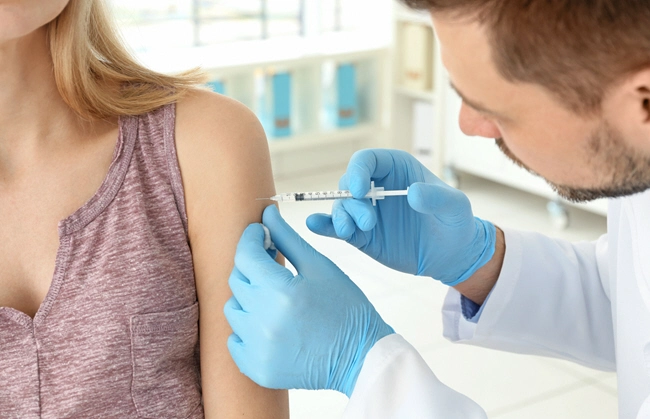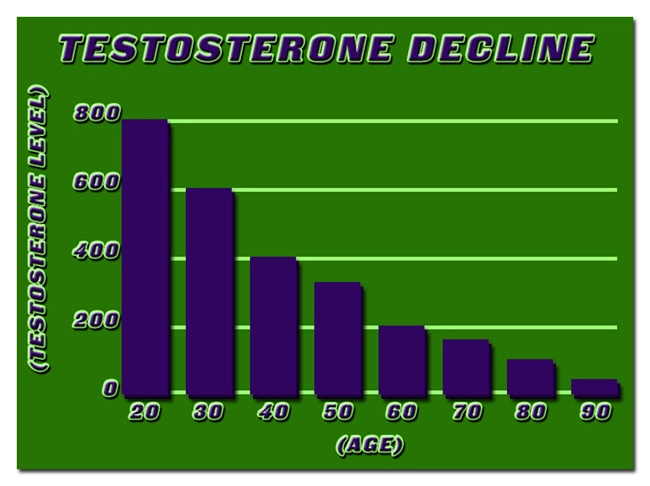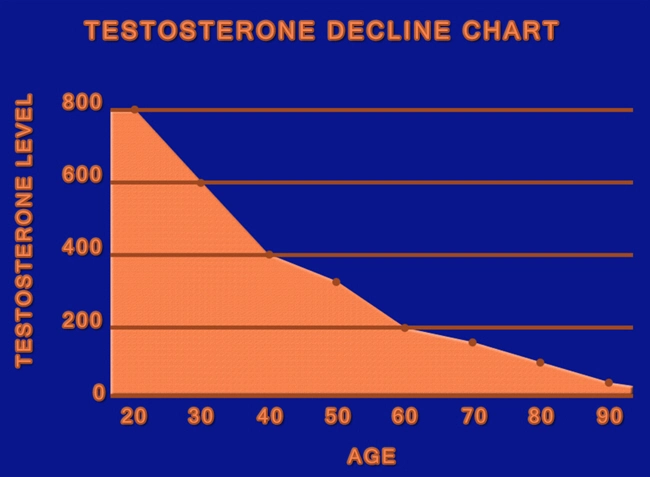
Video Link: https://vimeo.com/498804754
Video Download: Did You Know Lifestyle Plays A Huge Role In Testosterone Levels
Video Stream: Did You Know Lifestyle Plays A Huge Role In Testosterone Levels
Did You Know: Lifestyle Plays a Huge Role in Testosterone Levels
A recent study published in the journal Clinical Endocrinology has concluded that the lifestyles of middle-aged men play a crucial role in their testosterone levels.
“Age, BMI, socio-demographic and lifestyle factors, and prevalent medical conditions show independent and combined influences on sex hormone levels in a large population-based sample of community-dwelling men,’ stated Bu B. Yeap, Ph.D., professor of medicine at the University of Western Australia.
He added that “Given the magnitude of their associations, these factors should be considered for potential interventions when interpreting sex hormone results.”
In the study, researchers measured serum total testosterone and sex hormone-binding globulin levels (SHBG) of 208,677 men aged 40 to 69 years that participated in the UK Biobank study from 2006 to 2010.
Serum total testosterone was tracked using competitive binding chemiluminescent immunoassay, whereas serum SHBG was analyzed with a two-step, chemiluminescent immunoassay.
Researchers  measured free testosterone using the Vermeulen method. Demographic and medication information was obtained through self-reports, and information on prevailing medical conditions came from self-reports, physical exams, blood chemistry, and general practice records.
measured free testosterone using the Vermeulen method. Demographic and medication information was obtained through self-reports, and information on prevailing medical conditions came from self-reports, physical exams, blood chemistry, and general practice records.
Participants had an average serum testosterone concentration of 11.6 nmol/L, a median SHBG level of 36.9 nmol/L, and a median calculated free testosterone of 213 pmol/L. Lower serum testosterone and higher SHBG were connected with older age and higher Body Mass Index (BMI).
Measured free testosterone was lower for older study subjects and increased with BMI up to 25 kg/m2, at which point it dropped. Both the age and BMI links were independent of each other.
Mean testosterone was lower for participants who lived with a partner, had South Asian ethnicity, and higher educational achievement. Current smokers had higher mean testosterone levels than those who previously smoked or never smoked.
Vegetarians had the lowest mean testosterone levels, followed by those who consumed significant amounts of red meat, low amounts of red meat, poultry, fish, and no animal products. Testosterone was higher with more levels of physical activity, regardless of alcohol consumption.
Mean SHBG levels were lower for men who drank alcohol, whereas other associations between SHBG and dietary and physical activity patterns were similar to testosterone.
Lower testosterone levels were discovered in men with cardiovascular disease (CVD), cancer, diabetes, dementia, angina, renal impairment, hypertension, and chronic obstructive pulmonary disease compared with those without any of those conditions.
Low SHBG was connected with CVD, diabetes, angina, renal impairment, and hypertension. Atrial fibrillation was the only condition associated with higher testosterone and SHBG levels.
After analyzing the results, the study determined that a man of South Asian ethnicity who lived with a partner, ate a low amount of red meat, had a college or university degree, and had inadequate physical activity would have a lower mean testosterone level of about 2 nmol/L.
university degree, and had inadequate physical activity would have a lower mean testosterone level of about 2 nmol/L.
Men aged 70 years had a mean testosterone level 0.5 nmol/L lower than those who were aged 50 years, and participants with a BMI of 30 kg/m2 had a mean testosterone concentration 1.5 nmol/L lower than those who had a BMI of 25 kg/m2.
The researchers wrote that “The combined influences of socio demographic and lifestyle factors and medical conditions may provide an informative clinical context for interpreting testosterone and SHBG results in men aged 40 to 69 years.”
They also concluded that providers should individualize testosterone assessment and consider several modifiable lifestyle factors when evaluating testosterone levels for men aged 40 to 69 years.
And individualizing testosterone assessment is our specialty
That’s right. Our testosterone replacement regimens are state-of-the-art and the cutting-edge of the latest breakthroughs and developments in the world of hormone replacement. We consider the type of hormone (testosterone, growth hormone, sermorelin) that is best suited for you considering your age, current health issues, stress levels, and physical condition.
But we don’t stop the re. As the study concluded, several lifestyle modifications will boost testosterone even without treatment.
re. As the study concluded, several lifestyle modifications will boost testosterone even without treatment.
Just think about how much more effective these healthy lifestyle changes will be when our hormone replacement therapies are added to the mix!
At our clinics, we consider a number of factors to boost your testosterone to the next level. Beginning with what foods to eat that raise testosterone and how to enjoy consistent nights of deep, restorative, testosterone-elevating sleep, to an appropriate fitness routine, minimizing the debilitating effects of toxins, testosterone-raising nutritional supplements, and controlling the stress the decimates testosterone, we cover it all.
Stop wasting time. Contact us for a free, no-obligation discussion about the benefits of testosterone replacement that we can deliver to you!
Reference
Contact Us Today For A Free Consultation
Dear Patient,
Once you have completing the above contact form, for security purposes and confirmation, please confirm your information by calling us.
Please call now: 1-800-380-5339.
Welcoming You To Our Clinic, Professor Tom Henderson.

- Our HGH Clinic And Web Site Privacy Policy [Last Updated On: May 23rd, 2019] [Originally Added On: December 14th, 2017]
- Idaho HGH Clinics [Last Updated On: April 7th, 2023] [Originally Added On: March 19th, 2018]
- Injectable HGH Prescriptions In Cheyenne, Wyoming [Last Updated On: April 7th, 2023] [Originally Added On: March 3rd, 2019]
- Injectable HGH Prescriptions In Milwaukee, Wisconsin [Last Updated On: April 7th, 2023] [Originally Added On: March 3rd, 2019]
- Injectable HGH Prescriptions In Madison, Wisconsin [Last Updated On: April 7th, 2023] [Originally Added On: March 3rd, 2019]
- Injectable HGH Prescriptions In Green Bay, Wisconsin [Last Updated On: April 7th, 2023] [Originally Added On: March 3rd, 2019]
- Injectable HGH Prescriptions In Charleston, West Virginia [Last Updated On: April 7th, 2023] [Originally Added On: March 3rd, 2019]
- Injectable HGH Prescriptions In Vancouver, Washington [Last Updated On: April 7th, 2023] [Originally Added On: March 3rd, 2019]
- Injectable HGH Prescriptions In Tacoma, Washington [Last Updated On: April 7th, 2023] [Originally Added On: March 3rd, 2019]
- Injectable HGH Prescriptions In Spokane, Washington [Last Updated On: April 7th, 2023] [Originally Added On: March 3rd, 2019]
- Injectable HGH Prescriptions In Seattle, Washington [Last Updated On: April 7th, 2023] [Originally Added On: March 3rd, 2019]
- Injectable HGH Prescriptions In Washington D.C [Last Updated On: April 7th, 2023] [Originally Added On: March 3rd, 2019]
- Injectable HGH Prescriptions In Bellevue, Washington [Last Updated On: April 7th, 2023] [Originally Added On: March 3rd, 2019]
- Injectable HGH Prescriptions In Virginia Beach, Virginia [Last Updated On: April 7th, 2023] [Originally Added On: March 3rd, 2019]
- Injectable HGH Prescriptions In Richmond, Virginia [Last Updated On: April 7th, 2023] [Originally Added On: March 3rd, 2019]
- Injectable HGH Prescriptions In Portsmouth, Virginia [Last Updated On: April 7th, 2023] [Originally Added On: March 3rd, 2019]
- Injectable HGH Prescriptions In Norfolk, Virginia [Last Updated On: April 7th, 2023] [Originally Added On: March 3rd, 2019]
- Injectable HGH Prescriptions In Newport News, Virginia [Last Updated On: April 7th, 2023] [Originally Added On: March 3rd, 2019]
- Injectable HGH Prescriptions In Hampton, Virginia [Last Updated On: April 7th, 2023] [Originally Added On: March 3rd, 2019]
- Injectable HGH Prescriptions In Chesapeake, Virginia [Last Updated On: April 7th, 2023] [Originally Added On: March 3rd, 2019]
- Injectable HGH Prescriptions In Arlington, Virginia [Last Updated On: April 7th, 2023] [Originally Added On: March 3rd, 2019]
- Injectable HGH Prescriptions In Alexandria, Virginia [Last Updated On: April 7th, 2023] [Originally Added On: March 3rd, 2019]
- Injectable HGH Prescriptions In Montpelier, Vermont [Last Updated On: April 7th, 2023] [Originally Added On: March 3rd, 2019]
- Injectable HGH Prescriptions In West Valley City, Utah [Last Updated On: April 7th, 2023] [Originally Added On: March 3rd, 2019]
- Injectable HGH Prescriptions In West Jordan, Utah [Last Updated On: April 7th, 2023] [Originally Added On: March 3rd, 2019]
- Injectable HGH Prescriptions In Salt Lake City, Utah [Last Updated On: April 7th, 2023] [Originally Added On: March 3rd, 2019]
- Injectable HGH Prescriptions In Provo, Utah [Last Updated On: April 7th, 2023] [Originally Added On: March 3rd, 2019]
- Injectable HGH Prescriptions In Wichita Falls, Texas [Last Updated On: April 7th, 2023] [Originally Added On: March 3rd, 2019]
- Injectable HGH Prescriptions In Waco, Texas [Last Updated On: April 7th, 2023] [Originally Added On: March 3rd, 2019]
- Injectable HGH Prescriptions In San Antonio, Texas [Last Updated On: April 7th, 2023] [Originally Added On: March 3rd, 2019]
- Injectable HGH Prescriptions In Round Rock, Texas [Last Updated On: April 7th, 2023] [Originally Added On: March 3rd, 2019]
- Injectable HGH Prescriptions In Richardson, Texas [Last Updated On: April 7th, 2023] [Originally Added On: March 3rd, 2019]
- Injectable HGH Prescriptions In Plano, Texas [Last Updated On: April 7th, 2023] [Originally Added On: March 3rd, 2019]
- Injectable HGH Prescriptions In Pasadena, Texas [Last Updated On: April 7th, 2023] [Originally Added On: March 3rd, 2019]
- Injectable HGH Prescriptions In Midland, Texas [Last Updated On: April 7th, 2023] [Originally Added On: March 3rd, 2019]
- Injectable HGH Prescriptions In Mesquite, Texas [Last Updated On: April 7th, 2023] [Originally Added On: March 3rd, 2019]
- Injectable HGH Prescriptions In McKinney, Texas [Last Updated On: April 7th, 2023] [Originally Added On: March 3rd, 2019]
- Injectable HGH Prescriptions In McAllen, Texas [Last Updated On: April 7th, 2023] [Originally Added On: March 3rd, 2019]
- Injectable HGH Prescriptions In Lubbock, Texas [Last Updated On: April 7th, 2023] [Originally Added On: March 3rd, 2019]
- Injectable HGH Prescriptions In Lewisville, Texas [Last Updated On: April 7th, 2023] [Originally Added On: March 3rd, 2019]
- Injectable HGH Prescriptions In Laredo, Texas [Last Updated On: April 7th, 2023] [Originally Added On: March 3rd, 2019]
- Injectable HGH Prescriptions In Killeen, Texas [Last Updated On: April 7th, 2023] [Originally Added On: March 3rd, 2019]
- Injectable HGH Prescriptions In Irving, Texas [Last Updated On: April 7th, 2023] [Originally Added On: March 3rd, 2019]
- Injectable HGH Prescriptions In Houston, Texas [Last Updated On: April 7th, 2023] [Originally Added On: March 3rd, 2019]
- Injectable HGH Prescriptions In Grand Prairie, Texas [Last Updated On: April 7th, 2023] [Originally Added On: March 3rd, 2019]
- Injectable HGH Prescriptions In Garland, Texas [Last Updated On: April 7th, 2023] [Originally Added On: March 3rd, 2019]
- Injectable HGH Prescriptions In Fort Worth, Texas [Last Updated On: April 7th, 2023] [Originally Added On: March 3rd, 2019]
- Injectable HGH Prescriptions In El Paso, Texas [Last Updated On: April 7th, 2023] [Originally Added On: March 3rd, 2019]
- Injectable HGH Prescriptions In Denton, Texas [Last Updated On: April 7th, 2023] [Originally Added On: March 3rd, 2019]
- Injectable HGH Prescriptions In Dallas, Texas [Last Updated On: April 7th, 2023] [Originally Added On: March 3rd, 2019]
- Injectable HGH Prescriptions In Corpus Christi, Texas [Last Updated On: April 7th, 2023] [Originally Added On: March 3rd, 2019]
- Injectable HGH Prescriptions In Carrollton, Texas [Last Updated On: April 7th, 2023] [Originally Added On: March 3rd, 2019]
- Injectable HGH Prescriptions In Brownsville, Texas [Last Updated On: April 7th, 2023] [Originally Added On: March 3rd, 2019]
- Injectable HGH Prescriptions In Beaumont, Texas [Last Updated On: April 7th, 2023] [Originally Added On: March 3rd, 2019]
- Injectable HGH Prescriptions In Austin, Texas [Last Updated On: April 7th, 2023] [Originally Added On: March 3rd, 2019]
- Injectable HGH Prescriptions In Arlington, Texas [Last Updated On: April 7th, 2023] [Originally Added On: March 3rd, 2019]
- Injectable HGH Prescriptions In Amarillo, Texas [Last Updated On: April 7th, 2023] [Originally Added On: March 3rd, 2019]
- Injectable HGH Prescriptions In Abilene, Texas [Last Updated On: April 7th, 2023] [Originally Added On: March 3rd, 2019]
- Injectable HGH Prescriptions In Nashville, Tennessee [Last Updated On: April 7th, 2023] [Originally Added On: March 3rd, 2019]
- Injectable HGH Prescriptions In Murfreesboro, Tennessee [Last Updated On: April 7th, 2023] [Originally Added On: March 3rd, 2019]
- Injectable HGH Prescriptions In Memphis, Tennessee [Last Updated On: April 7th, 2023] [Originally Added On: March 3rd, 2019]
- Injectable HGH Prescriptions In Knoxville, Tennessee [Last Updated On: April 7th, 2023] [Originally Added On: March 3rd, 2019]
- Injectable HGH Prescriptions In Clarksville, Tennessee [Last Updated On: April 7th, 2023] [Originally Added On: March 3rd, 2019]
- Injectable HGH Prescriptions In Chattanooga, Tennessee [Last Updated On: April 7th, 2023] [Originally Added On: March 3rd, 2019]
- Injectable HGH Prescriptions In Sioux Falls, South Dakota [Last Updated On: April 7th, 2023] [Originally Added On: March 3rd, 2019]
- Injectable HGH Prescriptions In Columbia, South Carolina [Last Updated On: April 7th, 2023] [Originally Added On: March 3rd, 2019]
- Injectable HGH Prescriptions In Charleston, South Carolina [Last Updated On: April 7th, 2023] [Originally Added On: March 3rd, 2019]
- Injectable HGH Prescriptions In Providence, Rhode Island [Last Updated On: April 7th, 2023] [Originally Added On: March 3rd, 2019]
- Injectable HGH Prescriptions In Pittsburgh, Pennsylvania [Last Updated On: April 7th, 2023] [Originally Added On: March 3rd, 2019]
- Injectable HGH Prescriptions In Erie, Pennsylvania [Last Updated On: April 7th, 2023] [Originally Added On: March 3rd, 2019]
- Injectable HGH Prescriptions In Allentown, Pennsylvania [Last Updated On: April 7th, 2023] [Originally Added On: March 3rd, 2019]
- Injectable HGH Prescriptions In Salem, Oregon [Last Updated On: April 7th, 2023] [Originally Added On: March 3rd, 2019]
- Injectable HGH Prescriptions In Portland, Oregon [Last Updated On: April 7th, 2023] [Originally Added On: March 3rd, 2019]
- Injectable HGH Prescriptions In Gresham, Oregon [Last Updated On: April 7th, 2023] [Originally Added On: March 3rd, 2019]
- Injectable HGH Prescriptions In Eugene, Oregon [Last Updated On: April 7th, 2023] [Originally Added On: March 3rd, 2019]
- Injectable HGH Prescriptions In Tulsa, Oklahoma [Last Updated On: April 7th, 2023] [Originally Added On: March 3rd, 2019]
- Injectable HGH Prescriptions In Oklahoma City, Oklahoma [Last Updated On: April 7th, 2023] [Originally Added On: March 3rd, 2019]
- Injectable HGH Prescriptions In Norman, Oklahoma [Last Updated On: April 7th, 2023] [Originally Added On: March 3rd, 2019]
- Injectable HGH Prescriptions In Toledo, Ohio [Last Updated On: April 7th, 2023] [Originally Added On: March 3rd, 2019]
- Injectable HGH Prescriptions In Dayton, Ohio [Last Updated On: April 7th, 2023] [Originally Added On: March 3rd, 2019]









